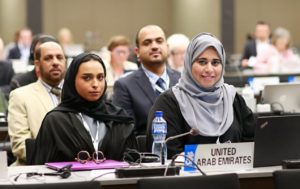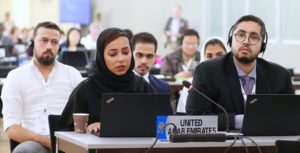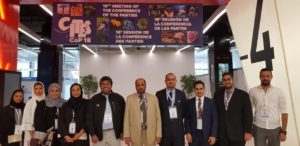UAE Showcases Experience In Endangered Species Conservation At 18th CITES Conference
An official UAE delegation participated in the 18th Meeting of the Conference of the Parties (CoP) to the Convention on International Trade in Endangered Species of Wild Fauna and Flora (CITES). The gathering witnessed the presentation and discussion of multiple documents and decisions related to the protection of endangered species and the implementation of the convention. Also on the agenda were meetings and side events aimed at promoting the achievement of the objectives of the convention.
The delegation included members from the Ministry of Climate Change and Environment (MOCCAE) that serves as the administrative authority implementing the convention, and the Environment Agency – Abu Dhabi as the scientific authority executing the convention, in addition to the Environment and Protected Areas Authority of Sharjah, the Environment Protection and Development Authority of Ras Al Khaimah, Fujairah Municipality and the International Fund for Houbara Conservation.
During the conference, held in Geneva, Switzerland, from August 17 to 28, 2019, the UAE delegates supported several recommendations proposed by the convention’s General Secretariat, including a recommendation to remove the UAE from the CITES national ivory action plans, based on its efforts to combat illegal trade in ivory. These efforts included submitting national reports to the convention’s secretariat, setting up a comprehensive Elephant Trade Information System (ETIS) to track illegal trade in ivory and other products related to elephants, launching capacity-building programs and cooperating with local authorities and the private sector to track and seize illegal shipments passing through the UAE’s territories.
The delegation also supported the recommendation to include Arabic as a working language of the convention through its participation in the working group formed to discuss its inclusion. Youth participation in the convention and the empowerment of young people was also supported to ensure greater engagement in wildlife conservation and decision-making processes.
The conference witnessed a number of important discussions, including a review of the convention’s strategic vision, cooperation with multilateral environmental organizations and other stakeholders, examining reports on capacity-building and discussing proposals for the UN World Wildlife Day.
Members also reviewed several executive topics and revised existing decisions on executive provisions, general compliance, trade regulation, exemptions and special trade provisions.
With regard to species-related issues, participants reviewed documents on the illegal trade in cheetahs, draft resolutions on the conservation of amphibians, reports and documents on coral reefs and rosewood trees, as well as sharks, rays, elephants, hawksbill turtles, sea horses, monkeys, lions, rhinos, and African gray parrots. The conference also discussed proposals to amend the species lists in Appendices I and II.
On the sidelines of the conference, the UAE delegation held a series of one-on-one meetings with several countries and non-governmental organizations to discuss protecting and conserving biodiversity and endangered species in order to strengthen the country’s efforts in this field.
The Ministry of Climate Change and Environment, in cooperation with the Sharjah Environment and Natural Reserves Authority and the International Fund for the Houbara Conservation, organized a special event to showcase the UAE’s experience in preserving and propagating endangered species, most importantly, the Houbara.
The General Secretariat of the convention recommended closing the file on illegal trafficking in cheetah, following the successful conclusion of the earlier recommended efforts to protect cheetahs through cooperation with international stakeholders. These included exchanging experiences and information among the concerned countries, in addition to carrying out capacity-building workshops, studies and surveys to analyze the status of the challenges and threats facing cheetahs.
The General Secretariat of the convention also reviewed the legislation enforced in all member states to regulate the international trade of endangered species of animals and plants. The revisions classified the UAE in the first category, implying that legislation in force in the UAE regarding the trade in endangered species complies with the requirements of the convention.
The conference praised the UAE model for its adoption of best practices in regulating the possession of dangerous animals, especially the big cat family, through enacting laws and regulations and enforcing deterrent penalties for the possession of these dangerous animals.
The Convention on International Trade in Endangered Species of Wild Fauna and Flora (CITES) is one of the most important international conventions aimed at regulating trade in these species so that it does not threaten the survival of these species in their natural habitats.
CITES works by subjecting international trade in selected species to certain controls. All import, export, re-export and introduction of species covered by the Convention has to be authorized through a licensing system. Each party to the convention must designate one or more management authorities in charge of administering that licensing system and one or more scientific authorities to advise them on the effects of trade on the status of the species.
Held every three years, the Conference of the Parties to the CITES Convention provides the main platform for monitoring progress in the conservation of species listed in the appendices reviewed. The convention reviews proposals for amending species lists in Appendices I and II as well as documents and reports submitted by the parties, standing committees, the secretariat and work teams. These enable the General Secretariat of the convention to make provisions, adopt the necessary budgets for more effective work, and present recommendations to improve the efficiency of the implementation of the convention, as well as adopt resolutions and hear member states’ positions on the proposed resolutions.








